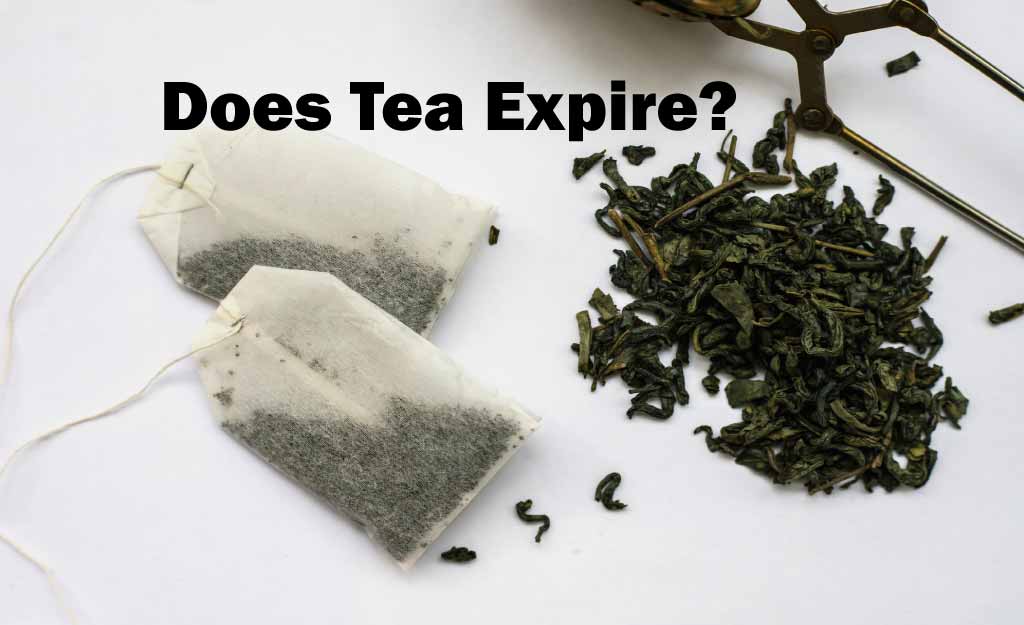Research shows tea is the most popular drink globally, second only to water. However, something even regular tea drinkers might be confused about is its shelf life. Can tea go bad? If so, then what are the signs you should open a new package?
Tea, whether in loose form or tea bags, does not expire. While tea technically does not go bad, it loses its aroma, color, and flavor over time. When stored properly in a cool, dry, and dark place, it can last for up to 2 years.
Read on as we discuss how to properly store tea for long-lasting flavor and what to look for if you suspect your tea is inconsumable.
What is the Shelf Life of Loose Tea?
Different types of loose tea leaves (black, oolong, green, and white) can last anywhere from 1 to 2 years in proper storage after their production. Most tea manufacturers print a “Best By” date on their packaging, which indicates the duration in which loose tea will still be flavorful and pleasant to drink.
Although, keep in mind that the “Best By” date is not the same as the expiration date that you find on various perishable products. Since loose tea does not really expire, any such date on packaging is merely an indicator of the tea’s freshness and aroma, which will start fading the longer you keep it stored.
How Long Do Tea Bags Last?
Like loose tea leaves, tea bags also last up to 2 years after production and are generally safe to consume even after the “Best By” date, given they are appropriately stored. (More on storage later in the article.)
Although, one should note that any mention of tea “lasting” for a specific period refers to its ability to maintain its aroma, vibrancy, and taste. Dried tea leaves, even when enclosed in bags, do not expire. However, tea can go bad over time when exposed to dampness or heat. Apart from exposure to such unfavorable conditions, tea does not expire or go bad.
Should you decide to have a cup of steaming tea made from tea bags sitting on your shelf for a long time, you may notice a change in the flavor. However, the beverage will still be okay to drink.
How Can You Tell If Tea Has Gone Bad?
While tea does not expire, it can go bad. It won’t go rancid like perishable items, say a carton of milk; instead, it will lose its characteristic flavor. However, sometimes there are changes in its appearance as well. Tea goes bad when it comes in contact with moisture or heat. There are few signs to look for to determine whether the tea is good to brew in such a case.
Look for changes in color and smell for loose tea leaves. If they look duller than usual, they may not impart their full flavor once brewed. Moreover, there can be mold if the package comes in contact with moisture or a heat source. For tea bags, any signs of holes in the paper or the bag can indicate the presence of bugs.
Remember that improper storage can cause the tea to go bad even within its “Best By” date. This date only indicates the company’s taste standards regarding beverage quality. However, it does not account for the conditions it has been stored in.
Even if you do not see the obvious signs of tea going bad but are unsure of its drinkability, it is always better to open a new pack.
How To Store Tea To Preserve Maximum Flavor?
Let’s talk about storage. We have mentioned numerous times already how storage affects the shelf life of loose tea leaves and tea bags. Luckily, storing tea is relatively straightforward. Follow these tips to ensure your tea lasts as long as possible.
Store In A Cool Place, Away From Light and Heat
After opening the package, you need to ensure that tea is stored in an airtight container, away from light, heat, and moisture. A cool dark place like a kitchen cabinet or a drawer works best. Keep away from stoves and windows.
Use an Opaque Airtight Container
Although you can use glass and plastic airtight containers (even a ziplock bag, for that matter), their transparency allows much more light and heat to pass through than an opaque option like a tin container. Therefore, if you must store tea in mason jars or other transparent containers, place them in a cool dark place, away from the heat source, for minimal permeation.
Do Not Store In The Refrigerator
Do not store tea in the fridge. While it may seem like a good idea to preserve flavor, the condensation caused by removing the package from the cold unit can impact the tea’s overall taste and shelf life.
What Type of Tea Stays Fresh The Longest?
Since black, green, and white tea come from the same plant, they eventually lose flavor. However, since black tea goes through a complete fermentation process, it maintains its flavor the longest, unlike green and white tea. Although, the freshness levels of dried tea also depend on the intactness of the leaf. As a rule, the longer the tea, the more its shelf life. Thus, black tea with long leaves will likely maintain its flavor the longest.
Does Having Tea After The “Best By”‘ Date Make You Sick?
Since tea does not really expire, thus, if there is no foul smell or any sign of mold and mildew, you can have it past its “best by” date without worrying about getting sick. Just make sure you have stored it properly. In contrast, if you think the tea has gone bad even without visible signs, it’s better to dump the pack and open a new one.
Any tea that has been in your pantry past its “best by” date will likely not make you sick. However, it may taste underwhelming, owing to the loss of essential flavonoids during its long storage. Not that steeping the tea longer than required will not make it taste better, only bitter.
Alternate Uses Of Old Tea
If you have old loose tea leaves or tea bags that you no longer intend to brew, you can use them for other creative purposes, such as in compost piles or using the brew as a watercolor for paintings.
Final Thoughts
Tea does not expire when stored in an airtight (preferably tin) container to be kept in a cool dark place, away from humidity and heat. However, tea loses color, flavor, and its distinct aroma with time. However, if exposed to moisture, tea can go. Usually, mold, a foul smell, or holes in the tea bags are indicators that the tea is no longer drinkable.

